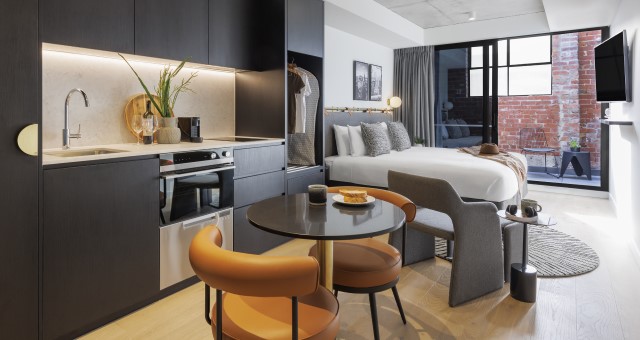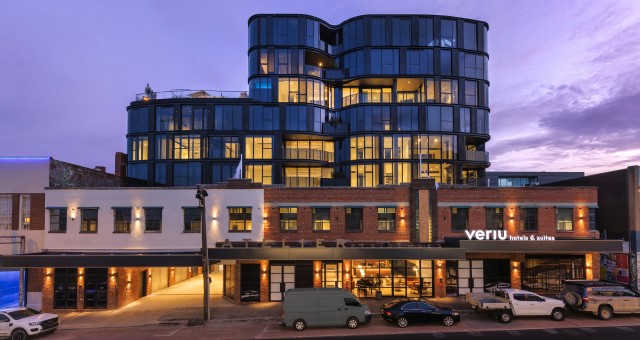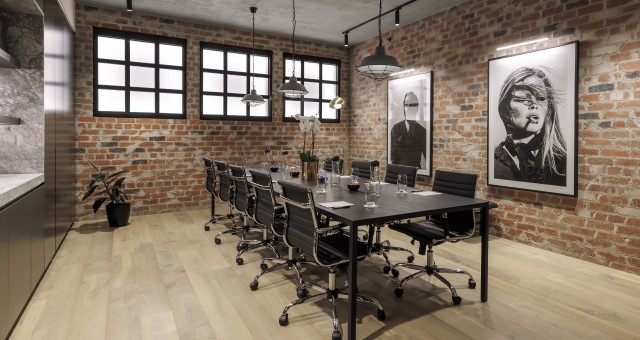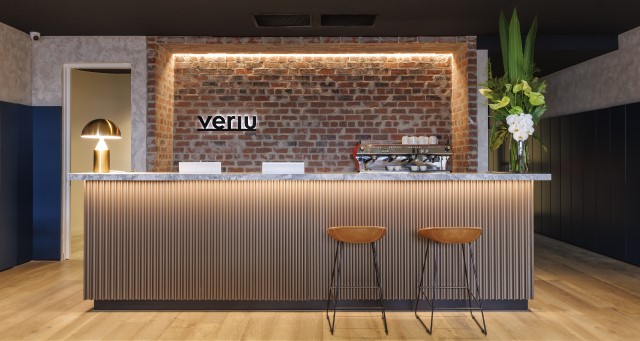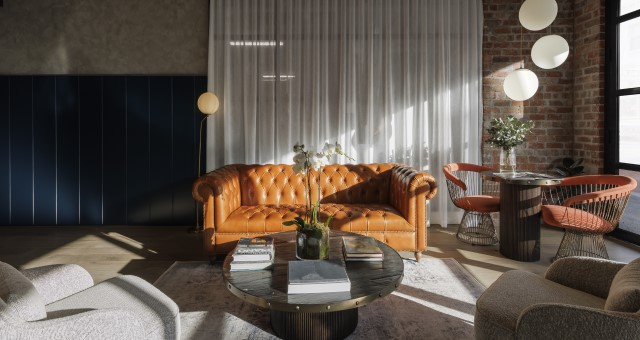Veriu Group CEO, Zed Sanjana, and developer Tim Gurner are celebrating a successful first six months of Veriu Collingwood, with the apartment hotel garnering strong occupancy and room rates since opening. Sanjana spoke to HM’s Ruth Hogan about the Collingwood project, mixed-use developments, opportunities in office conversions, and much more.
Tell us a bit about Veriu Collingwood and what makes this hotel particularly unique?
Veriu Collingwood is part of a mixed-use development with 95 studio apartments operating under the Veriu brand and 45 Built to Sell luxury residential apartments above us, which Tim Gurner has developed under the Atelier brand.
There’s a shared amenity terrace area which includes a bar, seating area, fire pits, outdoor cinemas, swimming pools, spa, as well as a fully equipped gym downstairs which is shared between the residential owners and the hotel guests. There is a small meeting space or boardroom, and we have a separate lobby and a separate entry point for the residents as well. Then there’s a couple of shops on either side of our lobby which are intended for hospitality operators.
The property is housed in a heritage building and some of the apartments face into the original façade. It feels very distinctly Collingwood – a lot of brickwork – and Tim had the vision of New York’s meatpacking district, so a lot of the F&B is themed around that style. Just a short walk around the corner is Smith Street, which has got some really interesting bars and restaurants that are very different from what you might get in the CBD.
How is the hotel performing since opening?
Veriu Collingwood kicked off trading exceptionally well. In fact, all five hotels that we opened last financial year are trading really strongly. Collingwood has probably exceeded my expectations, particularly considering it opened at the same time as another hotel in the area. The market’s exceptionally strong and we’ve been blown away by really strong rates well into the mid-$200s and occupancies have grown consistently – it’s in the 70%s now. What usually takes three years to ramp up probably will be done by the end of 18 months or so.
Is it mostly corporate guests or are you seeing much on the leisure side?
It is a mix. We focus on extended stay corporate travel but, because of all the great amenities and spa, we do get our share of leisure. A lot of the target [market] was around project-focused corporate opportunity. EndemolShine has been a customer of ours since we opened, so entertainment has been a big part of the industry-driven performance so far, as well as communications and IT.
Collingwood is one of those areas that’s quite fashionable as an office location nowadays, but they’re not the big multinationals, they’re smaller enterprises – startups, medium-sized businesses in the e-commerce space, so there’s a lot of business there, but there’s a lot more work to go and get it. It’s a lot of relationship building in the local market. And Collingwood is very community centric, so our team is really good at building the profile and engagement in the community which has helped us to perform quite well.
Do you see a lot of value in mixed-use developments at the moment?
More and more so. There are so many constraints and challenges in property development at the moment with the escalating construction costs and labour shortages across the industry, so finding ways to deliver a whole number of different uses within the building is the only way to do it in a lot of inner-city developments. From a residential developer’s perspective, it’s helpful for them as well because it enables them to massage the size and scale of their residential development so that they don’t necessarily have to go out to market to sell as many apartments, they can take a long-term lease from us which enables them to be able to get finance more readily, so that’s an advantage for the developer.
When we opened the first new-age Punthill in Caroline Springs in 2021, we built it above a neighbourhood shopping centre with Dan Murphys, IGA and 10 or 12 different restaurants. It works really well because the retailers and the hotel feed off each other, particularly in that self-catering serviced apartment space, it works really well and it’s great for the guest.
This is your first partnership with Gurner. Tell us about how you came to work together.
This is our first project together, but we’ve had a long-standing relationship, so it’s really exciting to be able to work with him on this.
When I left Quest in 2018 and bought into the Veriu business, it was actually one of the first deals that we did, so it’s great to see it come to life.
We work on these projects for a long time. Macquarie Park, which will be our biggest hotel with 184 apartments, will open in July next year. I had the conversation about that development in my first week in August 2018, so it’s very long lead times.
How is the long-term lease model performing in the current climate?
I think the long-term lease model is a really solid way of being able to give certainty to the developers to the financiers and valuers, because you’re underpinning an income stream, so that is helpful. But in terms of the cost of construction, it doesn’t help to solve that at all. The level of escalation is like nothing I’ve ever seen before. What would have cost us AU$175,000 to build 18-24 months ago has increased by 30%. Room rates really do drive your ability to pay enough rent to make the project feasible, so we’re grateful that room rates have gone up quite a bit since pre Covid but they’re still not at a level that can keep pace with the escalations that have occurred.
It’s a real race to secure labour in the sector, and you’re competing for with these major public infrastructure projects, so that’s putting huge upward pressures on pricing.
Office conversions are providing a lot of opportunities for hotels at the moment. You’ve got an Adelaide project in the works. Can you tell us a bit about that?
Yes, we have two office conversions in our pipeline, which is exciting. The Adelaide project with Pelligra Group is at 80 King William Street – a corner site in a prime CBD location. It’s an old office building that we see great potential to be able to convert to a hotel. The floorplates lend themselves quite readily to conversion, which is not always the case when you’re looking at potential office conversions. We’re looking to do a minimum of 110 keys under the Veriu brand there, but we’re also in discussions to perhaps expand that a little bit.
When you look at it from the owner’s perspective, the office market is in a state of transition. Office vacancy is super high, and when office buildings are getting towards the end of their life cycle, it’s very hard for those owners to compete with A-grade offices that have just been built with great inventory and facilities. Increasingly, particularly given office rents have declined, hotels have become a more feasible and appealing alternative.
We’ve got a similar project in the ACT in Tuggeranong, which is a suburb that has a big government department presence. We are looking to convert an office building there to a Punthill apartment hotel as well.
Do you have plans to expand further into other states beyond New South Wales and Victoria?
We’re absolutely looking to grow the brand in all Australian markets. Certainly, Queensland and Western Australia (WA) are still on the horizon for us. We unfortunately had a project fall over in Fremantle that wasn’t feasible. The price of construction in WA and Queensland is almost 25% higher than Victoria and New South Wales. In Queensland, we’ve got a huge corporate customer base around metropolitan and regional Queensland, so I’m sure we will get there in time. At the moment, the pipeline of hotels is more so in New South Wales and Victoria. In the next 18 months, we’ll have five hotels that will open, despite all the headwinds.

